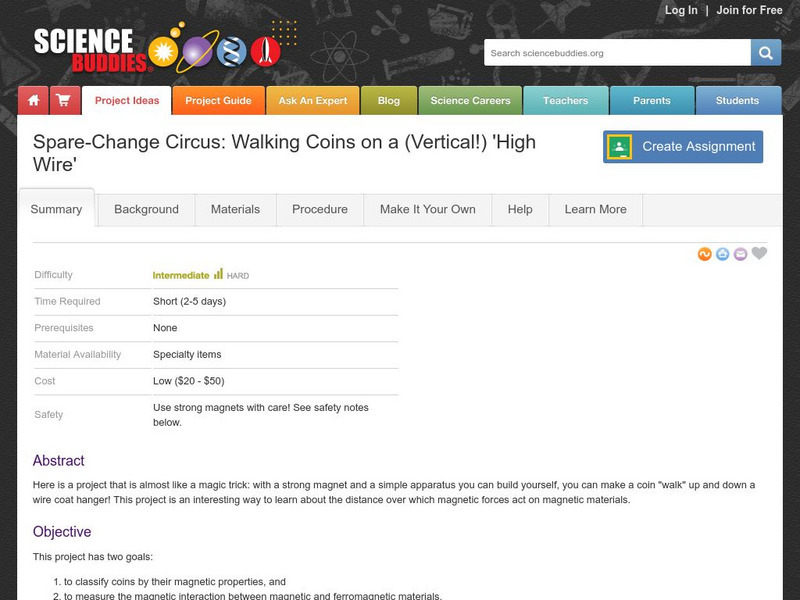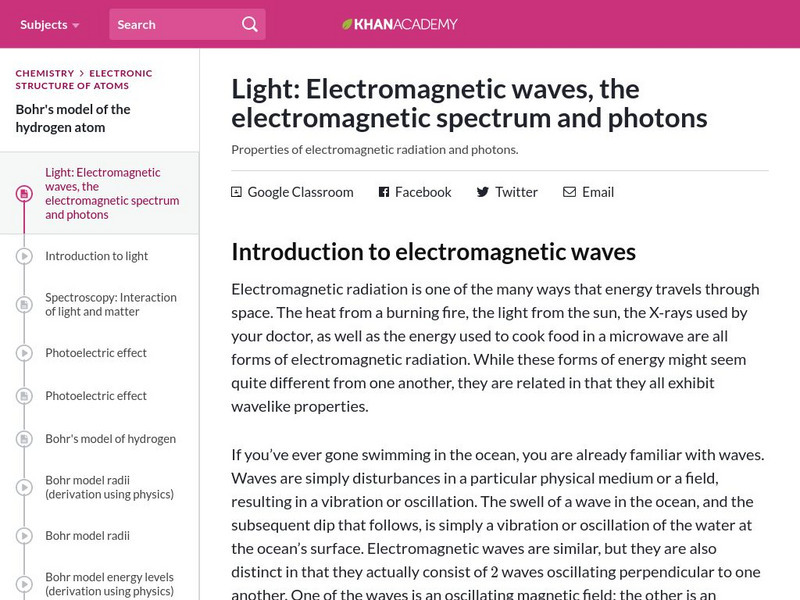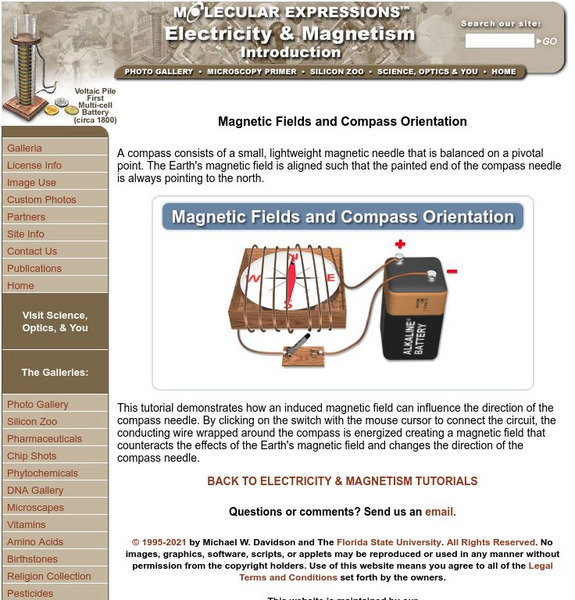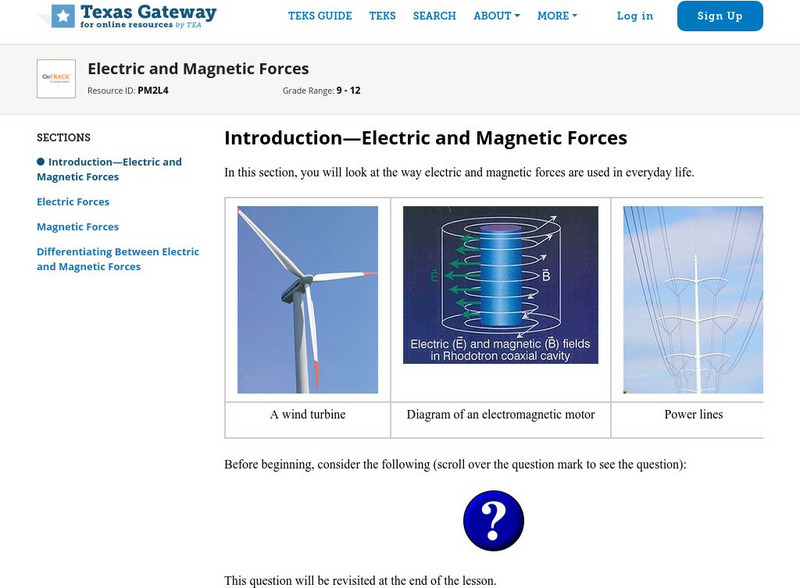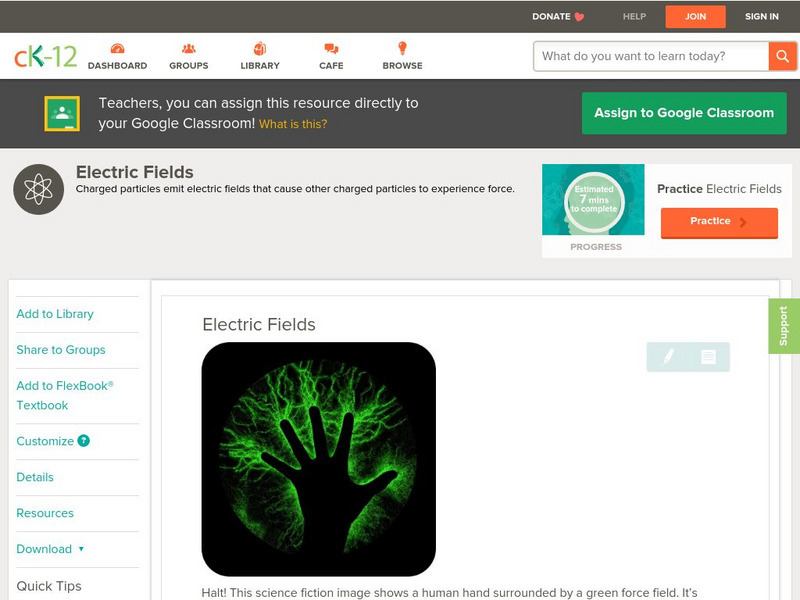Hi, what do you want to do?
National High Magnetic Field Laboratory
Magnet Academy: Roland Eotvos
Vasarosnamenyi Baro Eotvos Lorand, better known as Roland Eotvos or Lorand Eotvos throughout much of the world, was a Hungarian physicist who is most recognized for his extensive experimental work involving gravity, but who also made...
National High Magnetic Field Laboratory
Magnet Academy: Richard Feynman
Theoretical physicist Richard Phillips Feynman greatly simplified the way in which the interactions of particles could be described through his introduction of the diagrams that now bear his name (Feynman diagrams) and was a co-recipient...
Science Buddies
Science Buddies: Walking Coins on a (Vertical!) 'High Wire'
Here is a project that is almost like a magic trick: with a strong magnet and a simple apparatus you can build yourself, you can make a coin "walk" up and down a wire coat hanger. This project is an interesting way to learn about the...
University of Colorado
University of Colorado: Ph Et Interactive Simulations: Faraday's Law
An interactive simulation that teaches about Faraday's Law, magnets, and magnetic fields by showing how a change in the magnetic flux can produce a flow of electricity. This simulation can either be downloaded or played online and...
PBS
Pbs Kids:activities and Videos: Electricity
This PBS site offers videos and activities are hands-on challenges that focus on the engineering design process. They use simple materials, allow for multiple solutions, and are ideal for ages 9-12.
Khan Academy
Khan Academy: Electromagnetic Waves: The Electromagnetic Spectrum and Photons
An article that discusses the coupling of an electric field with a magnetic field to create electromagnetic waves. Article also discusses how different types of electromagnetic waves have different wavelengths which forms the...
Florida State University
Florida State University: Molecular Expressions: Magnetic Fields and Compass Orientation
Simulate the creation of an induced magnetic field through the use of a simple electric circuit. An interactive demonstration is included.
National High Magnetic Field Laboratory
Magnet Academy: Wimshurst Machine 1880
In the modern world, virtually everyone is familiar with electricity as an accessible, essential form of energy. In electricity's earlier days, scientists used the buildup and release of static electricity.
National High Magnetic Field Laboratory
Magnet Academy: Transmission Lines
Electricity goes through some ups and downs on its way from the power plant to your house. See how it works in this interactive activity.
National High Magnetic Field Laboratory
Magnet Academy: James Watt
The Scottish instrument maker and inventor James Watt had a tremendous impact on the shape of modern society. His improvements to the steam engine were a significant factor in the Industrial Revolution, and when the Watt engine was...
Texas Education Agency
Texas Gateway: Electric and Magnetic Forces
Given diagrams, illustrations, or descriptions, students will identify examples of electric and magnetic forces.
National High Magnetic Field Laboratory
Magnet Academy: William Thomson, Lord Kelvin
William Thomson, known as Lord Kelvin, was one of the most eminent scientists of the nineteenth century and is best known today for inventing the international system of absolute temperature that bears his name. He made contributions to...
National High Magnetic Field Laboratory
Magnet Academy: Nikola Tesla
Awarded more than 100 patents over the course of his lifetime, Nikola Tesla was a man of considerable genius and vision. He was reportedly born at exactly midnight during an electrical storm, an intriguing beginning for a man who would...
Exploratorium
Exploratorium: Science Snacks: Magnetic Pendulums
See how electricity and magnetism interact with this activity. Activity has students creating a current by swinging a copper coil through a magnetic field. The copper coil will start a second coil swinging as well.
National High Magnetic Field Laboratory
Magnet Academy: Sulfur Globe 1660
In the 17th century, German scientist Otto von Guericke built and carried out experiments with a sulfur globe that produced static electricity.
National High Magnetic Field Laboratory
Magnet Academy: Oersted's Compass
Recreate the discovery by Hans Christian Oersted about the relationship between electricity and magnetism in this very simple experiment.
National High Magnetic Field Laboratory
Magnet Academy: Felix Bloch (1905 1983)
Physicist Felix Bloch developed a non-destructive technique for precisely observing and measuring the magnetic properties of nuclear particles. He called his technique "nuclear induction," but nuclear magnetic resonance (NMR) soon became...
National High Magnetic Field Laboratory
Magnet Academy: Paul Lauterbur
Chemist Paul Lauterbur pioneered the use of nuclear magnetic resonance (NMR) for medical imaging. He developed a technique, now known as magnetic resonance imaging (MRI), in the early 1970s that involves the introduction of gradients in...
Florida State University
Florida State University: Magnet Lab: Discovery of Electromagnetism
Two scientists share the credit for discovering, and then interpreting, the phenomenon of electromagnetism.
Energy for Sustainable Development
Esd Bulgaria: Kids & Energy: Electricity
Electricity is the flow of electrical power or charge. It is a secondary energy source which means that we get it from the conversion of other sources of energy, like coal, natural gas, oil, nuclear power and other natural sources, which...
CK-12 Foundation
Ck 12: Physics Simulation: Electric Motor
[Free Registration/Login Required] Learn how magnetic forces acting on current-carrying wires can be used to drive an electric motor using this interactive simulation. A PDF worksheet and a video tutorial are also available. [2:47]
CK-12 Foundation
Ck 12: Physical Science: Electric Fields
Explore what an electric field is and how electric fields interact with this module. Module includes a video, interactive activity, and review questions.
CK-12 Foundation
Ck 12: Physics Simulation: Electric Analogies
[Free Registration/Login Required] Explore a different way of thinking about electricity as a way to become familiar with the concept of potential, current, and resistance using this interactive simulation. A PDF worksheet and a video...
Other
Bsi Education: Electrical Properties
The Applied Science resource consists of practical activities that demonstrate the importance of standard procedures in scientific work. Students examine electrical properties through a variety of activities. Some topics investigated are...







